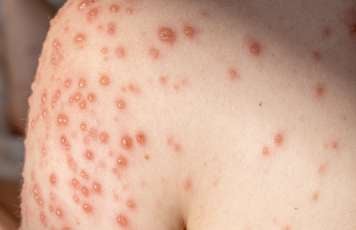What is chickenpox?
Chickenpox is a common childhood infection caused by a virus called varicella-zoster.
Although the infection is usually mild in otherwise healthy children, severe secondary infections can occur. Newborn babies and adults are at higher risk of complications.
Chickenpox is also very dangerous to people with immune system problems, or anyone taking medications that weaken the immune system. This includes steroids and drugs given to help organ transplant recipients.
What is shingles?
Shingles looks like chickenpox and is caused by the same virus. However, it usually appears on only one part of the body. Shingles happens when the virus flares up again after hiding in the body for some time. Only people who have already had chickenpox can get shingles. You cannot get shingles from someone who has chickenpox, but someone who has never had chickenpox can get infected if they are in direct contact with another person’s shingles rash.
Symptoms of chickenpox

Chickenpox usually begins with a fever. A day or two later, your child will get a rash that can be very itchy. The rash starts as red spots that soon turn into fluid-filled blisters. Some people have only a few blisters. Other people can have as many as 500. These blisters dry up and form scabs in four or five days.
Chickenpox spreads through contact or small droplets in the air
Chickenpox spreads easily. It can be acquired in two ways:
- Through direct contact with the virus, when touching the blisters of someone with chickenpox or shingles.
- Through droplets in the air, when someone with chickenpox sneezes, coughs or even talks.
The virus spreads most easily one or two days before the rash appears. A child with chickenpox can give the infection to other people until the blisters have dried up. Contact your school or daycare to find out when your child can return.
If one of your children has chickenpox, it will probably spread to other members of the household who are not already immune. If someone else catches the infection, it will usually appear two to three weeks after the first family member got it.
Treating chickenpox at home
If your child gets chickenpox, do not give acetylsalicylic acid (ASA) or any products that contain ASA. Taking ASA is not recommended in children with chickenpox because it increases the risk of liver complications.
To control your child's fever, use acetaminophen.
The chickenpox rash is very itchy. Take good care of the skin and make sure your child does not scratch it. A child who scratches a lot may get infections caused by bacteria that get into the skin.
You can do the following things to prevent this:
- Cut your child's fingernails short.
- Dress your child in lightweight clothing.
- Give your child lukewarm baths to help reduce the itch.
- If your child feels well enough, let them play and be active. This can take their mind off the itch.
- Your doctor may tell you the name of a cream to help reduce the itch.
A secondary infection caused by bacteria can be serious. These are some warning signs that bacteria have infected your child's skin through a blister:
- A new fever
- Infected skin is hot to the touch
- Pus from an infected blister
- Swelling and pain in the infected area
A bacterial skin infection needs to be treated by a health-care provider.
Preventing chickenpox infections and complications
You can prevent chickenpox by having your child vaccinated. Two doses of the chickenpox vaccine are given during childhood.
Chickenpox can cause problems for pregnant women
Pregnant women can get severe chickenpox and the virus can cause severe complications in the fetus.
If you are thinking of getting pregnant and have not had chickenpox or the chickenpox vaccine, talk to your health-care provider about getting vaccinated.
If you get infected with chickenpox or are exposed to chickenpox during your pregnancy, call your health-care provider right away.
If your child has a weakened immune system and you think they might have chickenpox or shingles, call their health-care provider
If your child has an immune system disorder, or is taking drugs that weaken the immune system, call their health-care provider right away. Your child may be treated with an antiviral medicine that makes the infection less serious.
Children with chickenpox get different care in hospitals
If your child is in hospital, and they have suspected or confirmed chickenpox, they will be placed in a separate room with special ventilation to reduce the risk of spreading the virus to other vulnerable children.
If your child goes to the hospital and you think they might have chickenpox, tell a health-care team member right away
If your child has already had chickenpox or two doses of the chickenpox vaccine, it is unlikely that your child can get infected with chickenpox. But if your child has never had chickenpox or the chickenpox vaccines, your child may become infected.
Let the health-care team know right away that your child was exposed to chickenpox or that you suspect chickenpox. They may need to take special care with your child to make sure the infection does not spread to other people.
